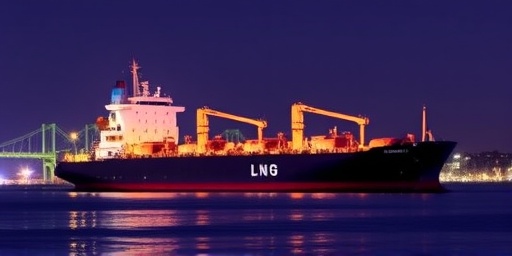In a stark warning to investors, Citi has dramatically cut its price target for Venture Global by 40%, dropping it to $18 per share from a previous $30. This move underscores the mounting pressures from persistently low LNG prices, which are squeezing margins across the energy sector and raising fears of a prolonged downturn.
Venture Global, a key player in the liquefied natural gas (LNG) market, has been riding high on ambitious expansion plans, but the analyst downgrade signals shifting tides. Citi‘s analysts pointed to global oversupply and subdued demand as primary culprits, forecasting that these weak LNG prices could linger for months, if not years, impacting not just Venture Global but the broader energy landscape.
Citi‘s Analysis Highlights LNG Market Vulnerabilities
Citi’s research team, led by senior energy analyst Edward Westlake, released a detailed report on Monday detailing the rationale behind the 40% slash in Venture Global’s price target. The report emphasizes that current LNG spot prices, hovering around $8 per million British thermal units (MMBtu) in key Asian markets, are well below the $12-15 breakeven threshold for many new projects. This discrepancy, according to Westlake, creates a “significant overhang” for companies like Venture Global, whose flagship Plaquemines LNG facility is ramping up production amid unfavorable economics.
“The LNG market is facing a perfect storm of increased supply from U.S. exporters and slower-than-expected demand growth in Europe and Asia,” Westlake stated in the report. “Venture Global’s aggressive buildout, while visionary, now risks overexposure to these volatile conditions.” The analysts project that global LNG trade volumes will grow by only 3% in 2024, down from earlier estimates of 5%, due to mild weather reducing European imports and China’s economic slowdown curbing appetite for energy imports.
To illustrate the severity, Citi included charts showing LNG prices have declined 25% year-over-year, with Henry Hub natural gas futures also dipping below $2.50/MMBtu. This environment has already led to project delays and cost overruns for Venture Global, which reported a 15% increase in capital expenditures for its upcoming CP2 LNG project in Louisiana.
Venture Global’s Expansion Ambitions Under Scrutiny
Venture Global has positioned itself as a disruptor in the LNG space since its inception in 2013, boasting some of the world’s most efficient liquefaction trains. The company’s Calcasieu Pass facility, operational since 2022, has exported over 100 million tonnes of LNG to date, securing long-term contracts with giants like Shell and BP. However, Citi’s downgrade questions the sustainability of this growth trajectory amid weak LNG prices.
Recent financials paint a mixed picture. In its latest quarterly earnings, Venture Global reported revenues of $2.1 billion, up 20% from the prior year, driven by higher export volumes. Yet, net income margins compressed to 12% from 18%, reflecting the pinch from lower realized prices. CEO Michael Sabel defended the company’s strategy in a recent investor call, saying, “Our modular construction approach gives us a cost advantage that will shine through when the market recovers. We’re not deterred by short-term volatility.”
Despite this optimism, regulatory hurdles are compounding challenges. The Federal Energy Regulatory Commission (FERC) recently approved an expansion but with stricter environmental stipulations, potentially adding $500 million to Venture Global’s costs. Citi’s report flags these as additional risks, estimating that delays could push full CP2 operations to late 2026, further eroding investor confidence.
Market data supports Citi’s concerns: Venture Global’s stock, traded on the NYSE under ticker VG, fell 8% in after-hours trading following the downgrade announcement, wiping out $1.2 billion in market cap. Trading volume surged 150%, indicating heightened investor anxiety in the energy sector.
Weak LNG Prices Ripple Through Global Energy Markets
The slump in LNG prices isn’t isolated to Venture Global; it’s a barometer for broader energy sector woes. Globally, LNG supply is set to surge with 140 million tonnes per annum (mtpa) of new capacity coming online by 2028, primarily from the U.S. and Qatar. This influx, per the International Energy Agency (IEA), could lead to a 10-15% oversupply if demand doesn’t keep pace, exacerbated by the ongoing energy transition toward renewables.
In Europe, where LNG imports hit record highs post-Ukraine invasion, prices have normalized after peaking at $70/MMBtu in 2022. Now, with Russian pipeline gas resuming via TurkStream and alternative supplies abundant, buyers are negotiating harder. A recent Platts survey revealed that 60% of European utilities plan to reduce spot LNG purchases in 2024, favoring cheaper pipeline options.
Asia, traditionally the largest LNG importer, faces its own headwinds. Japan’s JERA and Korea Gas Corporation have locked in more flexible contracts, but China’s state-owned importers are stockpiling at discounted rates, further depressing prices. BloombergNEF analysts note that this dynamic has led to a 30% drop in Northeast Asia LNG benchmarks since Q3 2023.
For the U.S. energy sector, the implications are profound. LNG exports, which accounted for 12% of total natural gas production in 2023, generated $50 billion in economic activity. Yet, with prices weak, producers like Cheniere Energy and Sempra have seen their valuations dip 10-20%. Citi warns that prolonged low LNG prices could deter $100 billion in planned investments, stalling the sector’s growth and affecting jobs in Gulf Coast states.
- Key Statistics: U.S. LNG export capacity to reach 170 mtpa by 2028, up from 90 mtpa today.
- Demand Forecast: Global LNG demand to grow at 4% CAGR through 2030, but short-term flatlining expected.
- Price Projection: Citi sees LNG averages at $9/MMBtu in 2024, versus $11 consensus.
Investor Reactions and Analyst Perspectives on Energy Sector Outlook
The downgrade has sparked a flurry of reactions from Wall Street peers. JPMorgan, maintaining a ‘neutral’ rating on Venture Global, echoed Citi’s concerns but suggested a milder 25% downside risk. “Venture Global’s contract book is robust, with 90% of volumes locked at above-market rates,” noted analyst Natasha Kane. However, she cautioned that renegotiation pressures from buyers could unwind these advantages.
Goldman Sachs took a more bearish stance, initiating coverage with a ‘sell’ recommendation and a $15 price target, citing geopolitical risks like potential U.S. export curbs under a new administration. “The energy sector is at an inflection point; LNG’s golden era may be fading faster than anticipated,” Goldman’s energy head remarked.
On the bullish side, some investors see opportunity in the dip. Hedge fund manager Paul Tudor Jones, via a recent CNBC interview, called Venture Global “undervalued at current levels,” predicting a rebound as global decarbonization drives long-term LNG demand for cleaner baseload power. Retail investors on platforms like StockTwits have piled in, with sentiment scores jumping to 65/100 post-downgrade.
Broader energy sector ETFs, such as the Energy Select Sector SPDR Fund (XLE), dipped 2% on the news, reflecting spillover effects. Oil majors like ExxonMobil, with stakes in LNG, reported softer Q3 results partly attributable to gas price weakness, underscoring the interconnectedness of the market.
Future Pathways: Navigating LNG Volatility and Sector Recovery
Looking ahead, Citi advises investors to monitor upcoming catalysts that could sway Venture Global’s fortunes. Key among them is the Department of Energy’s review of long-term export authorizations, expected in Q2 2024, which could either bolster or hinder U.S. LNG dominance. Additionally, the company’s first-of-its-kind floating LNG unit off Louisiana could provide a diversification boost if commissioned on schedule.
For the energy sector at large, recovery hinges on demand-side catalysts. The IEA’s latest World Energy Outlook projects LNG demand could double by 2040 if emerging markets accelerate coal-to-gas switches. Yet, near-term, Citi forecasts persistent pressure, with weak LNG prices potentially persisting through 2025 unless disrupted by events like extreme weather or supply outages.
Venture Global’s management has signaled resilience, planning a $10 billion capital raise to fund expansions despite the downgrade. Sabel emphasized in a press release, “We’re committed to delivering shareholder value through innovation and operational excellence.” Analysts will watch the company’s Q4 earnings closely for signs of cost-cutting or contract adjustments.
In this volatile landscape, the Citi downgrade serves as a clarion call for caution. As LNG prices stabilize or rebound, Venture Global could emerge stronger, but for now, the energy sector braces for an extended period of uncertainty, with investors recalibrating portfolios amid the shifting sands of global energy dynamics.








